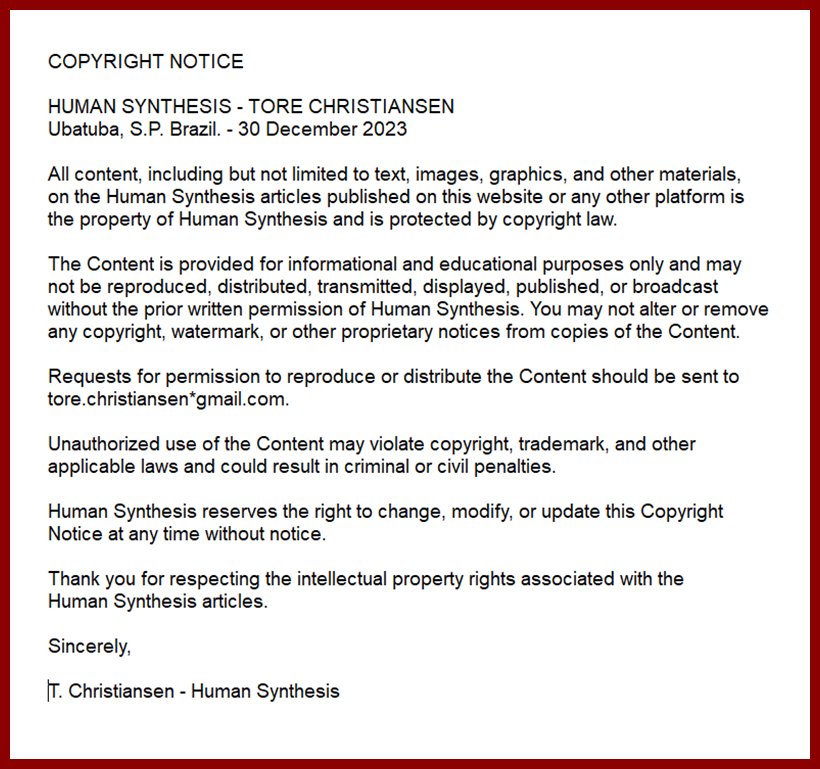ICJ’s Gaza decision shores up rules-based order and puts the West to the test
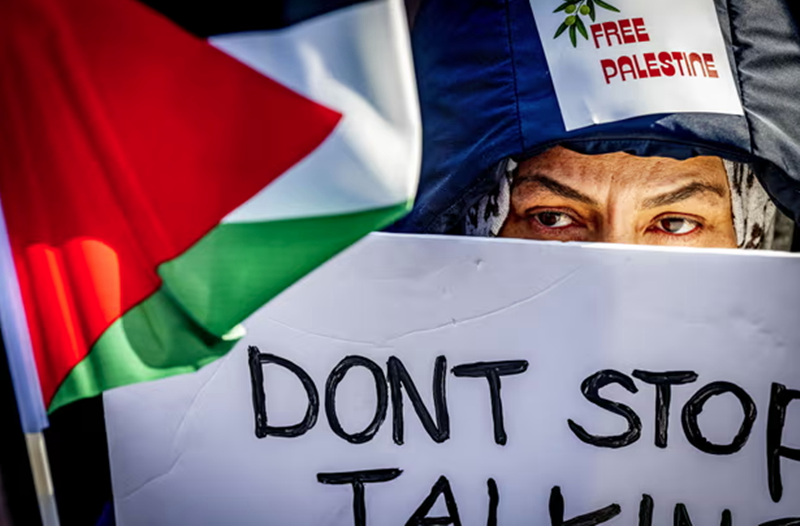
By Guardian - Patrick Wintour - Diplomatic editor - Fri 26 Jan 2024
UN court’s ruling is devastating for Israel and awkward for allies such as the UK and US, which belittled South Africa’s case.
In seeking a provisional order from the International Court of Justice restraining Israel from committing potentially genocidal acts in Gaza, South Africa put not just Israel’s treatment of Palestinians in the dock but also the whole post-second World War rules-based order, including the authority of the ICJ itself. Never has there been such a high-profile case brought in the middle of such a bloody conflict, and rarely have so many staked so much on the outcome.
In the words of the Irish barrister Blinne Ní Ghrálaigh, who set out part of South’s Africa case to the court, “the imminent risk of death, harm, and destruction that Palestinians in Gaza's, face today, and that they risk every day during the pendency of these proceedings, on any view justifies – indeed compels – the indication of provisional measures. Some might say that the very reputation of international law – its ability and willingness to bind and to protect all peoples equally – hangs in the balance.”
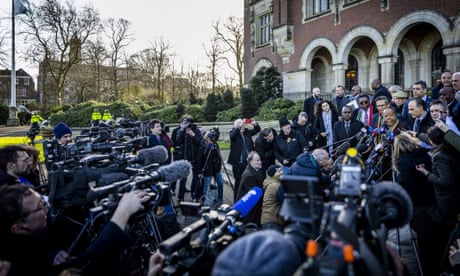
Extraordinarily, the court did not shirk from what it regarded as its responsibilities. It did not order a full ceasefire but it granted protective orders, including an end to the killing of Palestinians in Gaza, that went further than many international law experts were predicting.
The ruling is devastating for Israel and awkward for politicians such as the US secretary of state, Antony Blinken, who said the case was meritless, and the UK foreign secretary, David Cameron, who urged South Africa not to bandy around words such as genocide.
The highest court in the world, the apex of the United Nations, has found there is a plausible risk that Palestinians’ right to be protected from genocide is under threat from Israel’s actions. The irony of this is self-evident. The concepts of “crimes against humanity” and “genocide” were created by a Jewish law professor, Raphael Lemkin.
For Israel, a nation in part born in 1948 from the horrors of the Holocaust and centuries of persecution, this could be a moment for reflection. Its whole national identity is intertwined with the Holocaust, just as South Africa is indivisible from apartheid.
There will be many in Israel who dismiss the ruling as another sign of the antisemitic nature of the UN, an organization it has loathed for decades.
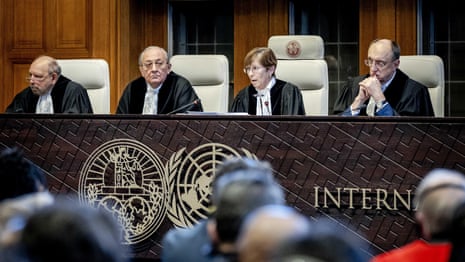
But the country knows the diplomatic damage. A confidential cable from the Israeli foreign ministry, obtained by Axios a month ago, stated that the case “could have significant potential implications that are not only situated in the legal world but have practical bilateral, multilateral, economic, security ramifications”.
It also presents a test for Israel’s allies, particularly the US and the UK. The court’s findings are binding but no enforcement mechanism save peer pressure exists, and there is no more important peer than the US.
On occasion, the US has taken to belittling the ICJ. Jeane Kirkpatrick, a past US envoy to the UN, described the court as far back as 1984 as “a semi-legal, semi-juridical, semi-political body that nations sometimes accept and sometimes don’t”.
But there are also many times in the more recent past when the US and the UK have urged countries such as Russia and Myanmar to implement fully what they described as the ICJ’s binding rulings.
The US has just spent millions successfully campaigning to ensure that its latest highly qualified candidate, Prof Sarah Cleveland, gained a seat on the ICJ. In endorsing her candidacy, Joe Biden said the court “remains one of humanity’s most critical institutions to advance peace around the world”. It will be hard for it to fulfill that critical role if Washington chooses to dismiss the court’s findings.
That does not mean the US is obliged to concur with the findings, but it does arguably have a duty as a signatory to the convention to support them. That would require it to urge its ally Israel to seek ways to comply with the court’s orders. The incentive for Washington to negotiate a ceasefire is also compounded.
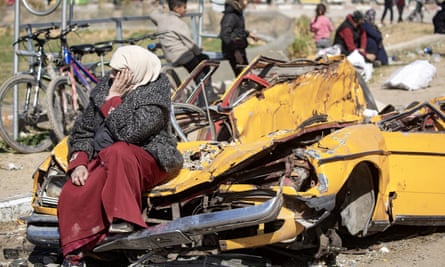
If, as appears likely, a country such as Algeria seeks to enforce the ICJ’s order through a UN Security Council resolution, the US will face a dilemma. It could deploy its protective veto and point out that other countries, notably Russia, have not complied with the ICJ’s recent ruling on Ukraine – but in so doing it would hand Moscow, a master of linguistic warfare, a gift-wrapped present.
In a remarkable lecture this week, the director of the Chatham House think tank, Bronwen Maddox, urged the West to recognize how vulnerable it was to charge of hypocrisy, and how it mattered.
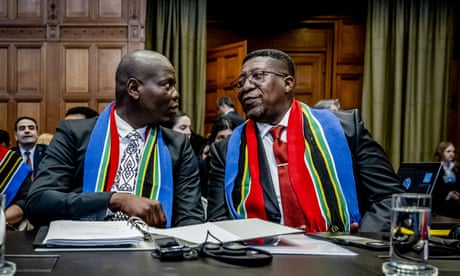
She said the argument about double standards “runs like this: the west cares about democracy, but not when it wants to install leaders it likes in other countries. It respects sovereignty except when it does not, as in Iraq. It argues for self-determination in Taiwan, not in Catalonia. It supports human rights, but not in countries from which it needs oil. It defends human rights except when it gets too difficult, as in Afghanistan.
“These accusations, if unanswered, give those countries that want to undermine the West a weapon even if their hypocrisy is luminous.” In this context, the dismissal of the ICJ would compound the problem.
In Israel’s defense, aspects of the ruling contain injustices, and Hamas, not being a state actor, does not come under the court’s jurisdiction, which is only to resolve disputes between states. It was largely let off the hook.
It can also be argued that South Africa used a backdoor device – the genocide convention and the low threshold of plausibility required at the interim stage – to get inside a courtroom to hear claims that are better described as breaches of international humanitarian law.
Israel can also rightly insist that the merits of the case – the existence of Israeli intent to commit genocide – have not yet been examined and will not be for many years.

Nor did the court grant South Africa’s ultimate objective of a ceasefire, as it did against Russia in the case of Ukraine in 2022. Instead, it ordered the Israeli military not to commit any of the acts proscribed under the convention, including the killing of the Palestinians, serious bodily and mental harm, and starvation.
Dr Henry Lovat, a lecturer in law at Glasgow University, took the absence of a ceasefire order as critical. “Israel has dodged the specter of a ceasefire order. On balance, the provisional orders will be within the range of anticipated non-worst-case outcomes for the Israeli delegation, and probably largely what was expected. The order to ‘take all measures within its power to prevent the commission of all acts within the scope of article II’ is essentially a restatement of the existing legal position. Similarly, the requirement to facilitate aid will have been anticipated and falls short of an international mechanism to require cooperation that South Africa had sought.”
Israel will doubtless find ways to interpret the orders to say it is already complying with them. Nor will it take kindly to the court restricting politicians’ freedom of speech by telling Israel to clamp down on incitement.
For the global south, and South Africa in particular, this is a famous victory, a moment that will be remembered for decades to come. The plight of the Palestinian people in Gaza was recounted in open court and believed. African countries have long criticized transnational bodies such as the International Criminal Court for apparently trying only Africans, at least to a large extent, while heinous crimes have occurred in many places. Some faith in their value will have been restored.
If the court had simply turned away, from whatever sincerely held legal principle, cynicism about international law as a possible avenue to settle differences would deepen, and those that advocate violent resistance would have been bolstered.
